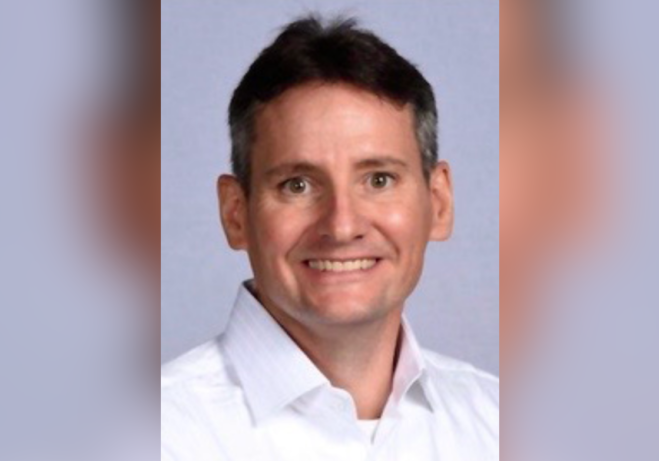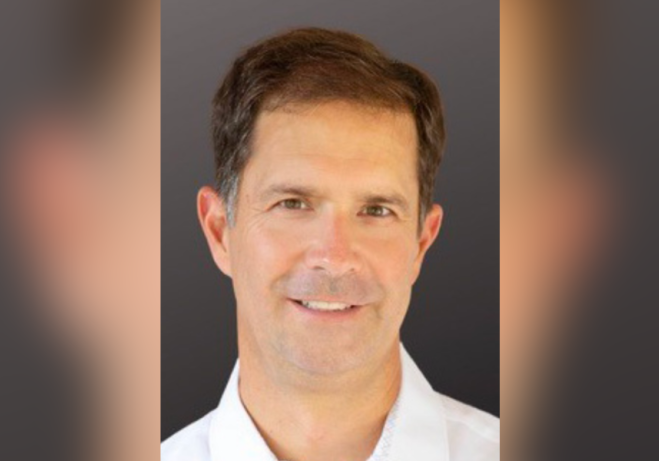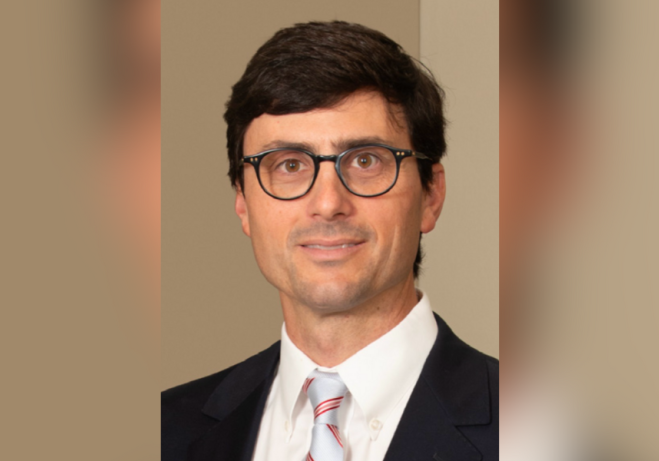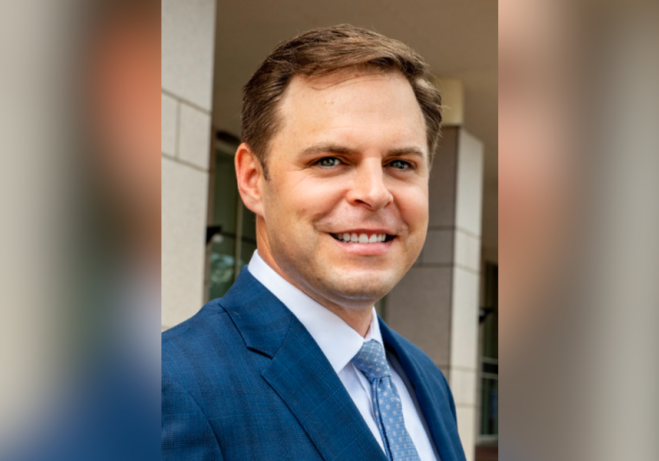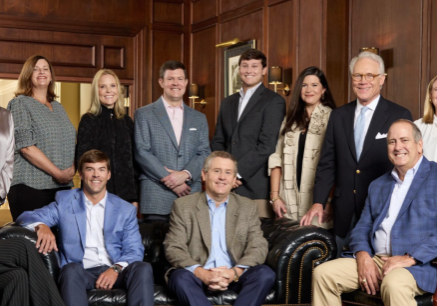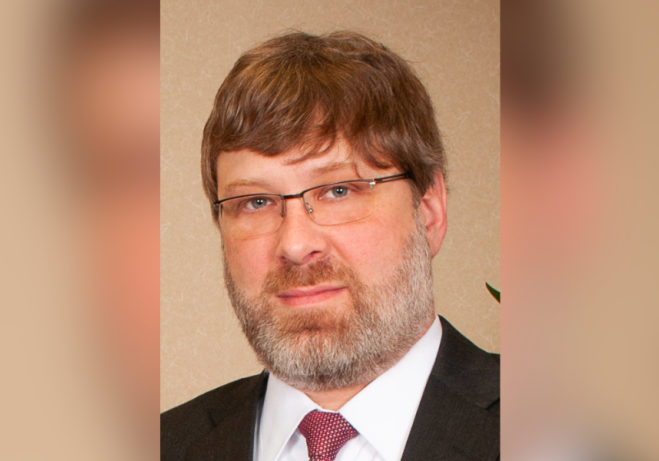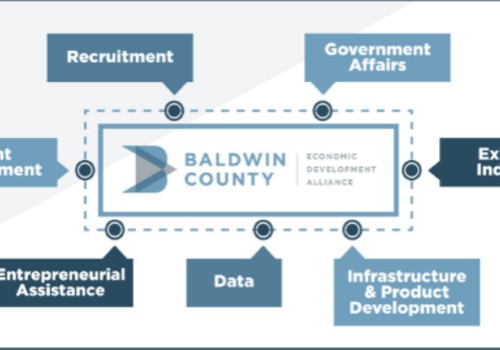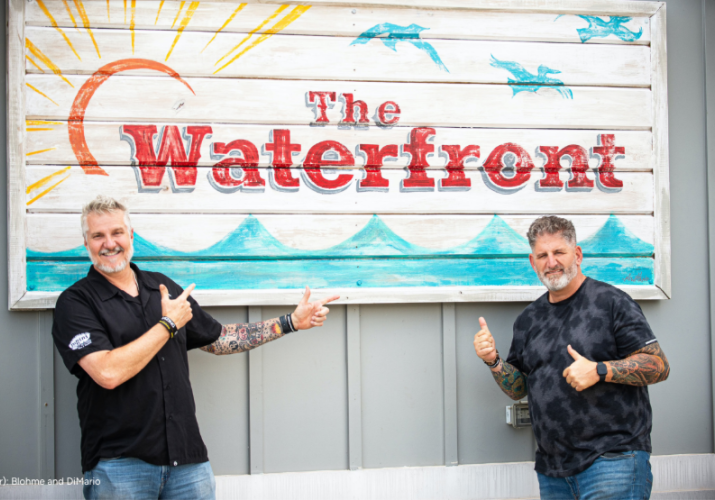Sandy Stimpson: Mayor of Mobile
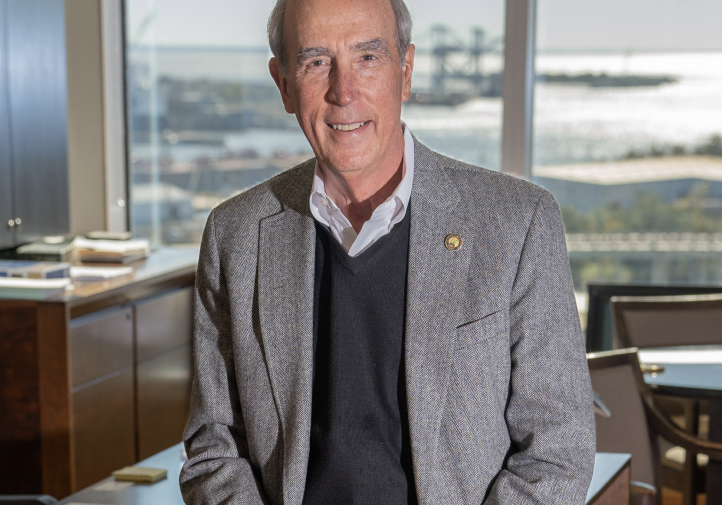
A conversation on his leadership, legacy and plans for the future
by Angie C. Baldwin
photography by Stephen Savage
From the windows of his corner office on the 10th floor of Government Plaza, Mobile Mayor Sandy Stimpson has quite a view. It’s one that allows him to survey the under-demolition Mobile Civic Center and its progress and some of the bustling businesses in Downtown Mobile. His administration has had a hand in the evolution of these projects and so many more over his nearly 12 years as mayor of Mobile. Through it all, Mayor Stimpson has never lost sight of why he wanted the job in the first place and why he also believes it’s the right time to leave it. He took some time to talk about this and more with your author (AB) and Bay Business News President T. Bruce MacKinnon between meetings at his office on a busy morning in November 2024.
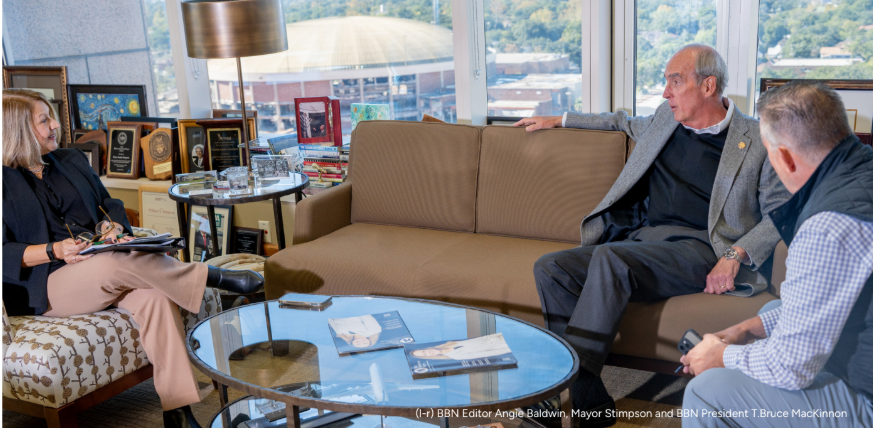
AB: As your last term as mayor winds down, can you look back and share with us what first inspired you to run for the job?
SS: It was a combination of a few things. At the time, I felt like Mobile could do better and be better, and I really did think we could make a difference. I had never seriously considered getting into politics, but several people had asked or encouraged me to run. That prompted me to really think and pray about it, knowing that God speaks through scripture, circumstances and through people. I didn’t want to get to Heaven, and God say, “Sandy, I kept sending you messages. Why didn’t you run?”
AB: What in your professional and personal history made you feel prepared to run the City of Mobile?
SS: Working in a very cyclical and capital-intensive lumber manufacturing business, which I did for nearly 40 years, you develop a lot of skill sets to be able to survive. I worked my way up in the family business filling nearly every role over time, eventually serving as chief financial officer and, ultimately, executive vice president. A big part of what I learned there was managing finances during good times and bad.
Before running for mayor, I had held leadership positions with organizations like the Mobile Chamber of Commerce, Business Council of Alabama, Alabama Policy Institute and UMS Wright Board of Trustees, and I was one of the co-founders and the first chairman of Prichard Preparatory School. These organizations touched a broad cross section of the community and the state, and I developed many important relationships during those years. As mayor, I knew that if I didn’t know the answers to something, there was someone I could call upon for help.
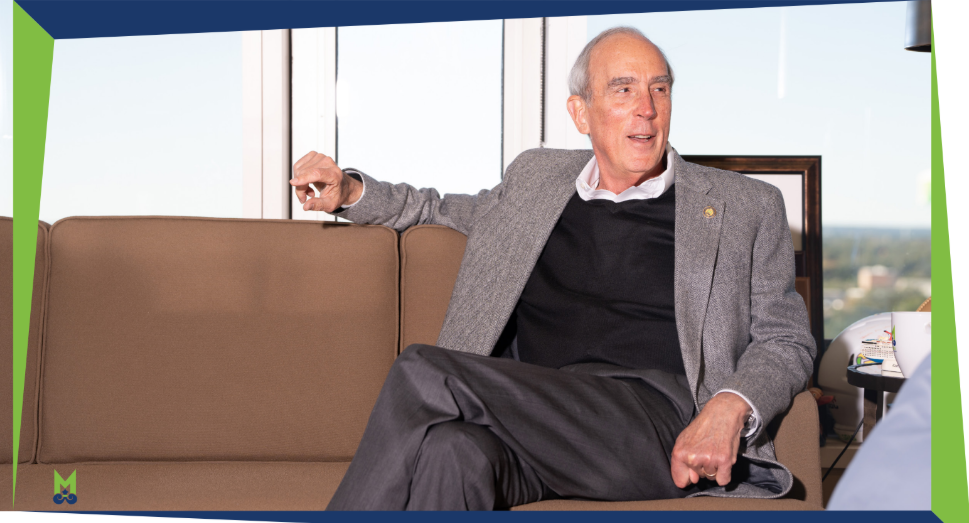
AB: Who were some of your mentors and biggest supporters along your professional journey, including as mayor?
SS: Early in my career, my father, William Herbert “Billy” Stimpson, and my uncles, Benjamin C. Stimpson and Gordon S. Stimpson, were my greatest mentors. Others include Don Kelly, USM Wright track and field coach and executive vice president of the Mitchell Company; David Cooper; Mark Foley; Gary J. Palmer; Dr. Lamar Allen Harrison; my siblings: Pamela Stimpson, Fred Stimpson and Richard Stimpson; my wife, Jean Stimpson; and my children: Billy Stimpson, Virginia Jeffery, Sands Stimpson and Nancy Vandervoot.
I have had many incredible people support me over the years, especially since I decided to run for mayor. Monique R. Henley, Pastor Joe Johnson, Pastor Aaron Früh and many others throughout the community have been praying for our success every day.
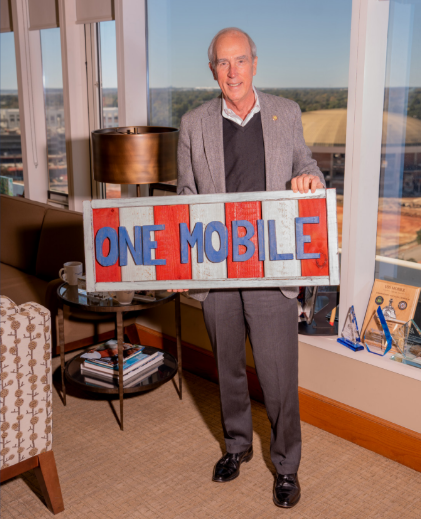
AB: Who has offered you the best advice?
SS: That’s a tricky question. The best advice is always timely, and that’s based on what your situation is at that moment. It’s the best advice you’ve ever gotten during those periods of time. All those mentors and strong supporters of mine have offered some kind of great advice over the years. My father always told us, “Your word is your bond.” And as simple as it is, he also often said: “Work hard and play hard.” It wasn’t all about work; it certainly wasn’t all about play. It’s about balance.
AB: Over the course of your three terms as mayor, what are some of the accomplishments of which you are most proud?
SS: There are several, including:
- The general financial position of the City of Mobile (According to the Mayor’s Office, since Mayor Stimpson took office, the City of Mobile has reduced its bonded indebtedness by nearly $100 million and unfunded liabilities for pension and benefits by $200 million — leading to significant credit rating increases from Moody’s and S&P.)
- The investment we have made in public safety (According to the Mayor’s Office, under the Stimpson administration, there have been unprecedented investments in first responders’ resources, tools, training and compensation. When Mayor Stimpson took office in 2013, one of his primary goals was to address the starting pay for our first responders, which at the time was one of the lowest in the region at $29,352. As a result of the new pay plan adopted this year, the baseline salary for new hires at the Mobile Police Department and the Mobile Fire- Rescue Department is $51,402).
- The relocation of the passenger air services to the Mobile International Airport at Brookley
The Annexation effort in 2023 will have a long- lasting, positive impact on the City of Mobile. (Mayor Stimpson spearheaded a successful annexation campaign last summer that brought thousands of new residents into the city limits and made Mobile the second-largest city in Alabama.) - The Demolition of the Mobile Civic Center and the plan to build a new, state-of-the-art Civic Arena (Mobilians and leaders have been discussing this for 20 years, and we are finally seeing it move forward. The former facility had lost millions of dollars over the last decade, and through our partnership with Oak View Group/Live Nation, we believe it can be a source of meaningful revenue.”)
- The consolidation of the properties around Brookley Aeroplex and the purchase of the Brookley by the Bay property, which is slated to become a waterfront park. (This is currently in the design phase.)
- The Progress on the Mobile River Bridge and Bayway Project (I-10 Bridge)
- I think one of the most effective things we’ve done is the Capital Improvement Program. In every City Council district, people are seeing positive results
- from their tax dollars, as far as investments in streets, sidewalks, drainage, parks and other infrastructure. (More than $200 million of improvements have taken place since 2016.)
AB: What were some of your biggest challenges as mayor? How did you overcome them?
SS: One of the biggest challenges we’ve faced has been crime and the perception of crime. Because of what’s going on in society, public safety is a challenge everywhere, but to me, it has always been the most essential function of government. Trying to overcome these challenges is a process. We’ve made a lot of progress, but you’re never at the finish line. Where we’ve made improvements, we’ve done that through embracing new ideas and programs. It’s not just policing; we’ve worked to be more proactive and focus on prevention in the areas where we can. We’ve also taken steps to ensure we have the right personnel, equipment and training to support our first responders.
The compensation level of city employees was also a challenge when I was first elected. For a while, we had a hard time attracting and retaining top talent because the wages were low. There had been several years where the city had given no raises or cost-of-living adjustments to city employees. We’ve given about 10 raises over the last 11 years. We’re competitive now.
Getting the Civic Center project over the finish line was a challenge because it required us to balance the interests of many citizens and many different organizations. The annexation effort in 2023 was also a heavy lift. It required a lot of hard work from city employees, volunteers and collaborators who saw the long-term benefits that effort would have for the City of Mobile and the areas of West Mobile that joined the city last year.
AB: If you can compare Mobile as it is now to where it was when you were elected, what are a few of the biggest differences?
SS: I think our city is more business-friendly, more family-friendly and more vibrant. There are so many exciting things moving forward, whether they’re being driven by the government or the private sector. There are incredible economic opportunities in our community and exciting developments that will have a significant impact on Mobilians’ quality of life. As far as the city government is concerned, I like to think that we are a more collaborative partner than we were 11 years ago. We work well with other government entities and partners in the private sector. We’re willing to work with anyone interested in moving Mobile forward.
AB: Can you share some unexpected aspects of the job?
SS: One of the things that was unexpected for me was when you become the mayor, you suddenly find yourself responsible for the actions of a lot of other people, regardless of whether those actions are approved or sanctioned. Somebody does something – an employee or a city board member – and all of a sudden, the mayor has a problem that needs to be addressed.
AB: What did you enjoy most about being the mayor of Mobile? And, if you are willing, what aspects of the job did you least enjoy?
SS: I have always loved meeting new people and promoting the city of Mobile. I also love visiting with students and children and speaking with young people about the importance of seeking out opportunities and preparing to be the leaders our community will need tomorrow. I have always loved construction projects and have enjoyed visiting the city’s active projects. I least enjoyed signing documents and attending City Council meetings.
AB: If you could change one decision you made as mayor, what would it be?
SS: Finding a way to transfer the ownership, management and maintenance of Ladd-Peebles Stadium sooner. Ladd Stadium is important to many people in the community, but it was also underutilized and a drain on city finances. The solution we found with the Mobile County Public School System was beneficial for everyone, and I wish we had made that happen sooner.
AB: Are there certain things you wish you had accomplished that didn’t work out?
SS: I wish we had handled the first annexation attempt in 2019 differently so it would have been successful. A city’s population has a direct impact on several things, including the distribution of federal grants. During the recovery efforts for COVID-19 alone, the City of Mobile missed out on millions of dollars in federal grants we would have received had the 2019 annexation been successful.
AB: What would you like the people of Mobile to remember you for?
SS: Moving our community past the moniker of “The City of Perpetual Potential.” Changing the image of Mobile to being a great place to live, work and play.
AB: Why do you feel it’s time for you to move on from your position as mayor?
SS: First and foremost was my family. My wife, children and grandchildren have sacrificed a lot to support me over the last 11 years as mayor. I want to give more of my time and attention to them. I’m also 72 years old, and at the end of a fourth term, I would be 77. I’m blessed to be in good health, but I had concerns about my ability to keep up with the pace that is required to give this job everything.
AB: What are your future plans, both personally and professionally?
SS: I plan to spend time with family and enjoy the things I love like the outdoors, hunting and fishing. Professionally, I want to find a way that I can share some of my knowledge and experiences from the private sector and from my time as mayor. I want to share some of the wisdom we have gained with others to help continue moving the city forward.
AB: Where do you see Mobile in five, 10, 20 years?
SS: It depends on the future leadership, but I can see Mobile having unprecedented growth in its population, in the number of available jobs and in the quality of life for our citizens.
AB: Will you endorse a mayoral candidate?
SS: To be determined!
Read More
Subscribe to our weekly newsletter
Sign up here for free to get Bay Business News email newsletter every Friday.
By subscribing, you agree to our User Agreement and Privacy Policy & Cookie Statement.


